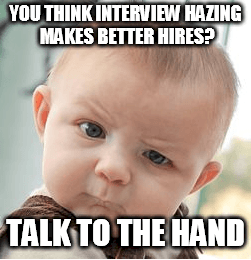In the January 26, 2016 Ask The Headhunter Newsletter, we talk about where parents fit in the career equation.
Question
I’m a senior at a big state university in the midwest. I have applied for many jobs and gotten a few leads, and some employers are inquiring via my LinkedIn account. The problem is that some of these employers require me to take silly numerical assessments that have nothing to do with the job, and I have to invest time in them before I can even have an interview.
Recently I was sitting before a group of managers and asked to use mental math on a series of frivolous arithmetical questions. I offered very close approximations, but was prompted to “be more specific.” I stopped and said, “Look, if I’m making decisions on the fly, I’m estimating. I’m not a human calculator. I’m here to do my job well, and this isn’t a tool I’ll utilize.”
I was escorted out. Did I make the right move? Are some interviews just a form of hazing that we are supposed to tolerate just because we’re applying for our first jobs?
Nick’s Reply
I’m sorry you’re having such a hard time, but I think you made the right move. I think some people would disagree, and suggest that you take whatever employers shovel at you, because you’re a new grad and need to get a job.
Sadly, this sort of new-grad employment hazing is common. The attitude among some employers seems to be that, since you have no real experience they can judge you on, anything goes. Why are manhole covers round? How many barbers do you think are in Chicago? What animal would you be, if you could be any animal? Or, do some quick math out loud so we can see whether you’re smart. (It gets worse. See Top 10 Stupid Interview Questions: #1 – #5.)
These are excuses for employers’ failure to learn how to assess whether a person can do a job. (See What is the single best interview question ever?) I think your instinct is correct. These are not legitimate interview practices. HR buys these lame “screening tools” from “HR consultancies” run by failed HR people. It’s really stupid. I compliment you for coming out of school and questioning what seems to be standard procedure that isn’t legit, smart, or acceptable.
Such ridiculous screening practices tell you a lot about an employer and what it would be like to work there. Smarter companies are coming to realize how this kind of nonsense reflects on them. Google, for example, recently announced it would stop using silly questions to assess candidates, because the company did an outcomes analysis and found such questions don’t predict an employee’s success. (See 4 HR Practices That Kill ROI.) More employers need to reconsider their screening methods.
As I mentioned above, you’ll find that many people will advise you to shut up and play ball, and to never question the people who control the job offer. But I’ll tell you to never hesitate to judge the managers who are interviewing you.
In Fearless Job Hunting, Book 8: Play Hardball With Employers, (p. 28) I offer this advice:
Judge a manager’s sincerity about working together. Does she want to hire you because you can add something to the way the work is done, or does she want another interchangeable part for her machine? Listen carefully to what the manager says. You will hear either a mind interacting with your own, or a machine waiting to grind you up.
Too often, in an effort to impress a manager, candidates calculate their answers so they’ll add up for the manager — but not for the candidate. Consider that if you need to calculate your answers this way, there’s a good chance you’re playing to the interview rather than setting the stage for an honest, accurate judgment.
What would happen if you answered simply, directly and honestly? Perhaps the manager would not like your answer. Perhaps your answer would cost you the job. That’s good. Because, do you want to work with a manager who can’t deal with you?
It’s your choice. Every question a manager asks tells you something about the manager. Every reaction to your answers tells you something, too. The manager is judging you. Don’t forget to judge the manager.
Consider that out of dozens of interviews, only one might turn into a job offer. Likewise, out of dozens of employers, only one might behave professionally enough to be worth working for. It’s up to you to use your good sense to judge who’s worthy. The idea that you should sit back and take whatever an interviewer throws at you — that’s about as reasonable as you tossing silly questions at employers and expecting them not to kick you out of interviews. Hazing, whether practiced by college fraternities and other social groups, or by employers, reveals that the group has nothing better to offer than a pathetic demonstration of its own insecurity.
If you’re going to be shown the door — like you were — let it be because you have higher standards than an employer whose idea of interviewing is silly hazing. (See Raise your standards.)
When you find a good employer, you’ll know it. There are some excellent ones out there who will engage you in discussion about the work they want done, and who know how to assess your abilities respectfully and intelligently. They’re worth looking for. Meantime, remember that stupid interview questions are sometimes a sign of stupid employers. Move on.
How do you handle silly interview questions? (Maybe you don’t think the example in this Q&A was so silly?) Do you have ways of helping keep interviews on track? Have you ever been rejected because you couldn’t explain what animal you would be, if you could be any animal?
: :




